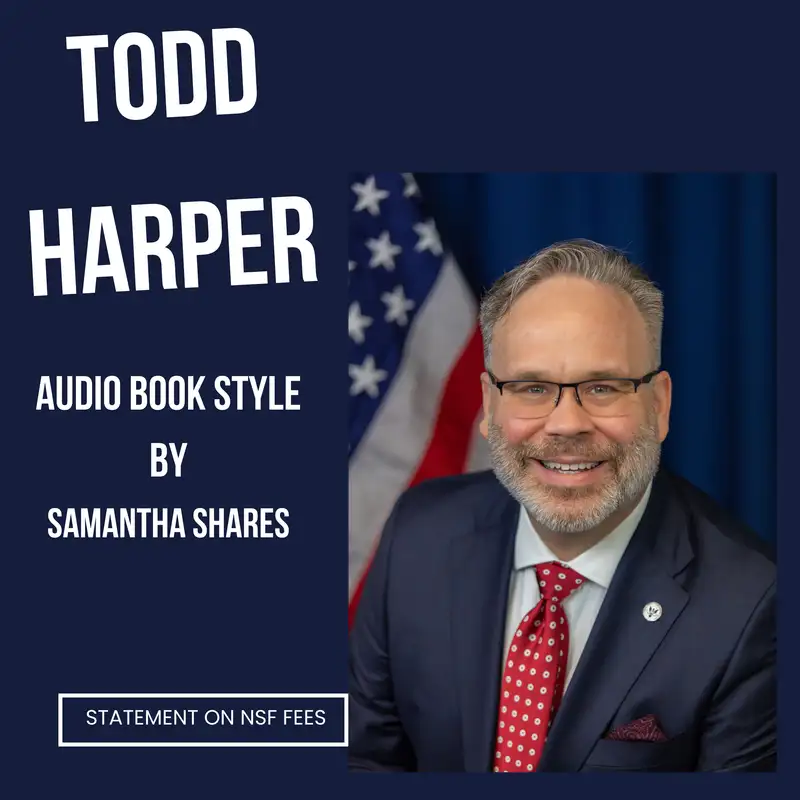NCUA Board Member Todd Harper Statement on the Decision to Curtail the Collection of Overdraft and Non-sufficient Fund Fees
Samantha: Hello, this is Samantha Shares.
This episode covers N C U A Board
Member Todd Harper Statement on the
Decision to Curtail the Collection of
Overdraft and Non-sufficient Fund Fees
The following is an audio version of
that Statement This podcast is
educational and is not legal advice.
We are sponsored by Credit Union
Exam Solutions Incorporated, whose
team has over two hundred and
Forty years of National Credit
Union Administration experience.
We assist our clients with N C
U A so they save time and money.
If you are worried about a recent,
upcoming or in process N C U A
examination, reach out to learn how they
can assist at Mark Treichel DOT COM.
Also check out our other podcast called
With Flying Colors where we provide tips
on how to achieve success with N C U A.
And now the Statement.
N C U A Board Member Todd Harper issued
the following statement about the agencyâs
decision to curtail the collection
of total overdraft and non-sufficient
fund (NSF) fees for federally insured
credit unions with more than $1
billion in assets beginning with Call
Reports for the first quarter of 2025.
For markets to work efficiently,
transparency is needed.
Thatâs a bedrock principle of economics.
And, itâs one of the many reasons why
credit union member-owners and the
public should have clear visibility
into the income a credit union
generates from overdraft and NSF
fees charged to its member-owners.
To advance credit union efforts to
benchmark fees against other financial
institutions, improve marketplace
competition, and increase consumer
understanding of the fees theyâre charged
within the credit union system, the N
C U A required federally insured credit
unions with more than $1 billion in
assets to disclose, separately, income
from overdraft and NSF fees beginning
with the 2024 first quarter Call Report.
With todayâs release of the 2024
fourth quarter Call Report results,
however, that desirable transparency
experiment will regrettably end.
During the last year, weâve found that
reporting institutions have collected $3.8
billion in such fees.
Some charged no fees at all.
For most reporting credit unions,
overdraft and NSF fees accounted for
between 2 and 5 percent of revenue.
Some outliers charged fees amounting
to as much as 18 percent of income.
For those billion-dollar-plus credit
unions with higher overdraft and NSF
fees, we also found that they did not
use those fees to subsidize better
interest rates or lower other fees.
Federally insured banks with more
than $1 billion in assets began
reporting these numbers in 2015.
Since then, consumers have
benefitted as banks have lowered
their reliance on such fees.
In fact, the Consumer Financial Protection
Bureau found that roughly two out of
three banks with $10 billion or more
in assets have eliminated NSF fees,
saving consumers $2 billion annually.
Yet, among credit unions with greater
than $10 billion in assets, four out
of five continue to charge NSF fees.
That overreliance on such fees is
one of the many reasons why the N
C U A began collecting and publicly
reporting this data on Call Reports.
But, by unilateral action by the
Chairman, credit union member-owners
and the public will now no longer have
access to this important information.
If credit unions are to live up to their
statutory purpose of supporting the
financial needs of âpeople of modest means
and the credit union movementâs oft-touted
âpeople-helping-peopleâ philosophy,
then credit union member-owners should
have access to this basic market
information, so they can make better
decisions about how and where to deposit
and access their hard-earned money.
While the N C U A will no longer
publish overdraft and NSF fee income
for individual credit unions on
a real-time quarterly basis, the
agency will instead collect the data
during supervisory examinations.
This approach, however, will likely
shield credit union members from
accessing the information through
the Freedom of Information Act.
Ultimately, this non-disclosure
will result in financial exclusion,
especially when one considers that NSF
is a fee for not paying for an item.
In my view, the N C U A should
restore fee transparency for overdraft
and NSF fees on Call Reports.
If the Chairman is unwilling to reverse
course, then the overdraft and NSF fee
data collected in the exam process at
individual credit unions shouldnât be
shielded from public release through
the Freedom of Information Act.
If such data was once already
public information, why
now sweep it under the rug?
The Chairman also noted that the
appropriateness of overdrafts and NSF
fees charged is a matter between a
credit union and its member-owners.
If those member-owners ultimately
determine how their credit union is
run, then credit union management
should make their overdraft and NSF
income upon member-owner request.
As a steward of the credit union system
and someone whose father and grandfather
started credit unions, I strongly
believe in the concept of a credit
union movement to lift up everyone.
But, this unnecessary decision moves
that credit union movement closer to
an industry, one thatâs worse than
banks when it comes to fee disclosures.
Profiting from consumersâ problems
will come back and bite you.
Americaâs credit union
member-owners deserve better.
This concludes the statement.
If your Credit union could use assistance
with your exam, reach out to Mark Treichel
on LinkedIn, or at mark Treichel dot com.
This is Samantha Shares and
we Thank you for listening.

